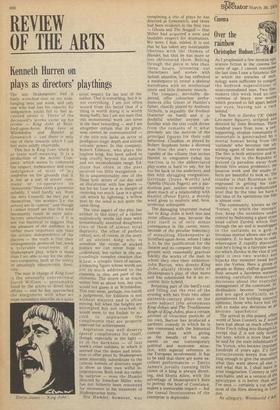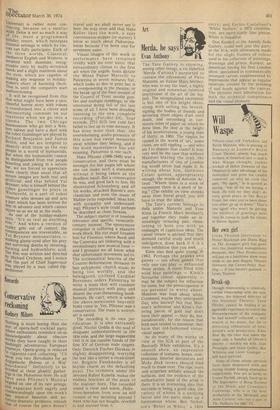Cinema
Over the rainbow
Christopher Hudson
As I prophesied a few months ago' science fiction in the cinema has come of age. I cannot remember the last time I saw a futuristic film in which the miracles of technology were sufficient to conquer, the bedrock superstitions 0' unaccommodated man. Two Mt1. makers this week lead us into varieties of brave, new worlds which proceed to fall apart before our eyes, leaving not a rack behind.
The first is Zardoz ('X' Odeon Leicester Square), scripted and directed by John Boorman. Three hundred years from now, a selfsupporting, utopian community of immortals is gatecrashed by 8 mortal human being from the 'outlands' who becomes the no' witting agent of their destruction. The film is both attractive and infuriating. Set in the Republic of Ireland (a paradise away from British film union problems), the location work and the studio effects are beautiful to look at. The trouble is that Boorman is so engrossed in getting his cone munity to work at a sophisticated level that by the time we have 8 fair idea of its operations the film is almost over.
The community, known as the 'Vortex,' in which the 'eternals' live, keep the outsiders under control by fashioning a giant stone head called Zardoz which Me; through the air and is worshipPet; in the outlands as a god. frivolous eternal allows one of the outsiders, Z, to learn how to read, whereupon Z rapidly discovers that he's living in a fairytale world (to which Zardoz is the clue if Y011., split it into two words) an" hijacks the monster head back into the Vortex. Here a group of people in flimsy chiffon garments float around a Jacobean mansion making carefully democratic decisions about the everydaY management of the commune. In" dividualists become 'renegades' and are aged artificially as, a, punishment for holding unsoca' opinions; those who have lost th,e, will to make any decisions at an become 'apathetics' The arrival in this poised, effete world of Sean Connery as z would have had about as much effect as Peter Finch riding into Shangri-La; except that Z is not only morta' but sexy, which is more than can, be said for the male inhabitants 0' the Vortex, who became impotent hundreds of years ago. Z's fatal attractiveness keeps him alive long enough to give the immorta'S what they want above all else and what that is, I shall leave t° your imagination. Connery is ved watchable, and as a version of the apocalypse it is better than anY I've seen — certainly a cut above most of the films showing in Low don. As allegory, Westworld CAA'
, Universal) is rather more convincing, because on a smaller scale. Delos is not so much a way of life, more a programmed holiday resort, which recreates
i fictional settings in which its visitors can fully participate. Each of the three worlds, Classical, , Mediaeval English and Western, is invested with dummies, recognisable only by badly-wrinkled hands and a slight mistiness about , the eyes, which are capable of making any response to holidaymakers short of harming them. That is, until the computers start malfunctioning. It will be recognised from this that what might have been a nice, Cheerful horror story with robots is transformed into a clever and disconcerting comment on our reactions when we go into a cinema. The two Chicago businessmen who go into a Western saloon and have a duel with the robot Gunslinger are played by Richard Benjamin and James Brolin, and we are tempted to identify with them as the real People in a world of humanoids. But when the humanoids cannot be distinguished from real people , brawling and joking in a saloon bar, we are forced to appreciate More clearly than usual that all screen images are both real and artificial, and that behind Yul 8rYnner, who is himself behind the robot gunslinger he plays in Westworld, is a sort of robot creature who dresses up and acts apart which has been written for hirri in advance and which cannot Injure us as we sit in the stalls.
As one of the holiday-makers says, "It's as real as anything else." And when a version of reality gets out of control, the consequences are irreversible, as Yul Brynner demonstrates _ ' 'talking glassy-eyed after his prey and surviving deaths by shooting, burning and hydrochloric acid. The film was written and directed by Michael Crichton, and I notice that the part of Chief Supervisor Was played by a man called OpPenheimer.



































 Previous page
Previous page